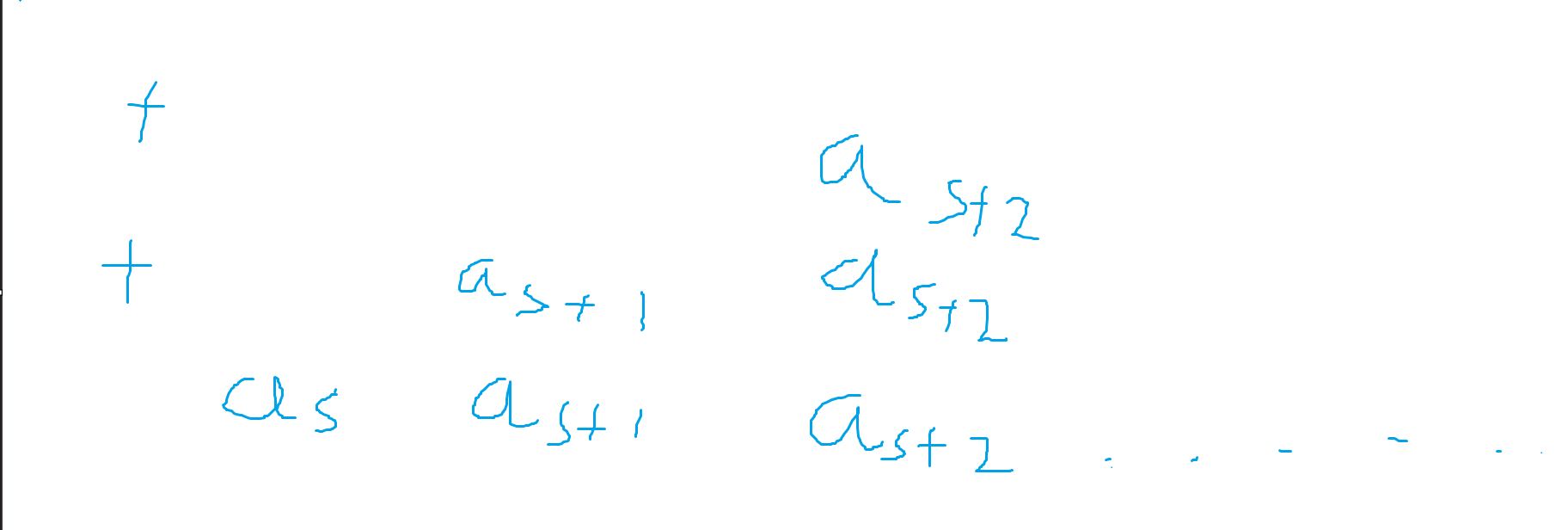CF1921F Sum of Progression 题解
题目链接:CF 或者 洛谷
一道经典的类型题,把这种类型的题拿出来单独说一下。
注意到问题中涉及到需要维护

我们会惊讶地发现,从某个位置往后不断地走
注意到一点,在预处理时,每一种块长如果我们都暴力的情况下,从小块长开始,比如从块长为
-
-
这就是这类问题的模版框架。如果出现修改,我们对于查询的调整可能发生调整,比如有时候查询的是具体的值,那么可以考虑每种块长的贡献即可,最后会给出例题。
回到本题,我们需要对小块长维护怎样的信息,考虑到查询直接维护
先考虑简单情形:
如果
类似于阿贝尔求和假如知道:
那么很显然有原式子拆成如下图求和:

可以看出每一行都是一个区间和,借助前缀和,不妨设当前查询的最后一个数为
很容易看出,前面其实就为一个前缀和,后面则是“前缀和数组”的区间和形式,显然维护前缀和数组的前缀和就能办到了。
现在抽象一下,如果
事实上,我们把上式改写一下:
其中

那么上面的式子显然可以改写为:
这里的
-
-
其中易知道
那么上述式子就可以轻易改写了:
其实只需要注意到,前缀和作差中后一项不再是
最后的细节
注意到有类似
带注释参考代码
#include <bits/stdc++.h> // #pragma GCC optimize("Ofast,unroll-loops") // #pragma GCC optimize(2) // #define isPbdsFile #ifdef isPbdsFile #include <bits/extc++.h> #else #include <ext/pb_ds/priority_queue.hpp> #include <ext/pb_ds/hash_policy.hpp> #include <ext/pb_ds/tree_policy.hpp> #include <ext/pb_ds/trie_policy.hpp> #include <ext/pb_ds/tag_and_trait.hpp> #include <ext/pb_ds/hash_policy.hpp> #include <ext/pb_ds/list_update_policy.hpp> #include <ext/pb_ds/assoc_container.hpp> #include <ext/pb_ds/exception.hpp> #include <ext/rope> #endif using namespace std; using namespace __gnu_cxx; using namespace __gnu_pbds; typedef long long ll; typedef long double ld; typedef pair<int, int> pii; typedef pair<ll, ll> pll; typedef tuple<int, int, int> tii; typedef tuple<ll, ll, ll> tll; typedef unsigned int ui; typedef unsigned long long ull; typedef __int128 i128; #define hash1 unordered_map #define hash2 gp_hash_table #define hash3 cc_hash_table #define stdHeap std::priority_queue #define pbdsHeap __gnu_pbds::priority_queue #define sortArr(a, n) sort(a+1,a+n+1) #define all(v) v.begin(),v.end() #define yes cout<<"YES" #define no cout<<"NO" #define Spider ios_base::sync_with_stdio(false);cin.tie(nullptr);cout.tie(nullptr); #define MyFile freopen("..\\input.txt", "r", stdin),freopen("..\\output.txt", "w", stdout); #define forn(i, a, b) for(int i = a; i <= b; i++) #define forv(i, a, b) for(int i=a;i>=b;i--) #define ls(x) (x<<1) #define rs(x) (x<<1|1) #define endl '\n' //用于Miller-Rabin [[maybe_unused]] static int Prime_Number[13] = {0, 2, 3, 5, 7, 11, 13, 17, 19, 23, 29, 31, 37}; template <typename T> int disc(T* a, int n) { return unique(a + 1, a + n + 1) - (a + 1); } template <typename T> T lowBit(T x) { return x & -x; } template <typename T> T Rand(T l, T r) { static mt19937 Rand(time(nullptr)); uniform_int_distribution<T> dis(l, r); return dis(Rand); } template <typename T1, typename T2> T1 modt(T1 a, T2 b) { return (a % b + b) % b; } template <typename T1, typename T2, typename T3> T1 qPow(T1 a, T2 b, T3 c) { a %= c; T1 ans = 1; for (; b; b >>= 1, (a *= a) %= c)if (b & 1)(ans *= a) %= c; return modt(ans, c); } template <typename T> void read(T& x) { x = 0; T sign = 1; char ch = getchar(); while (!isdigit(ch)) { if (ch == '-')sign = -1; ch = getchar(); } while (isdigit(ch)) { x = (x << 3) + (x << 1) + (ch ^ 48); ch = getchar(); } x *= sign; } template <typename T, typename... U> void read(T& x, U&... y) { read(x); read(y...); } template <typename T> void write(T x) { if (typeid(x) == typeid(char))return; if (x < 0)x = -x, putchar('-'); if (x > 9)write(x / 10); putchar(x % 10 ^ 48); } template <typename C, typename T, typename... U> void write(C c, T x, U... y) { write(x), putchar(c); write(c, y...); } template <typename T11, typename T22, typename T33> struct T3 { T11 one; T22 tow; T33 three; bool operator<(const T3 other) const { if (one == other.one) { if (tow == other.tow)return three < other.three; return tow < other.tow; } return one < other.one; } T3() { one = tow = three = 0; } T3(T11 one, T22 tow, T33 three) : one(one), tow(tow), three(three) { } }; template <typename T1, typename T2> void uMax(T1& x, T2 y) { if (x < y)x = y; } template <typename T1, typename T2> void uMin(T1& x, T2 y) { if (x > y)x = y; } constexpr int N = 1e5 + 10; constexpr int Size = ceil(sqrt(N)); constexpr int CNT = (N + Size - 1) / Size + 1; int n, q; ll a[N]; ll pre[CNT + 1][N]; ll Prepre[CNT + 1][N]; inline void solve() { cin >> n >> q; forn(i, 1, n)cin >> a[i]; int siz = sqrt(n); forn(i, 1, siz) { forn(j, 1, n) { pre[i][j] = a[j]; if (j > i)pre[i][j] += pre[i][j - i]; Prepre[i][j] = pre[i][j]; if (j > i)Prepre[i][j] += Prepre[i][j - i]; } } forn(i, 1, q) { ll s, d, k; cin >> s >> d >> k; ll ans = 0; if (k <= siz or d >= siz)forn(i, 1, k)ans += a[s + (i - 1) * d] * i; else { int end = s + (k - 1) * d; int endpre = end - d; ans = k * pre[d][end] - (Prepre[d][endpre] - Prepre[d][max(s - 2 * d, 0ll)]); } cout << ans << " "; } forn(i, 1, siz)forn(j, 1, n)pre[i][j] = Prepre[i][j] = 0; cout << endl; } signed int main() { // MyFile Spider //------------------------------------------------------ // clock_t start = clock(); int test = 1; // read(test); cin >> test; forn(i, 1, test)solve(); // while (cin >> n, n)solve(); // while (cin >> test)solve(); // clock_t end = clock(); // cerr << "time = " << double(end - start) / CLOCKS_PER_SEC << "s" << endl; }




【推荐】国内首个AI IDE,深度理解中文开发场景,立即下载体验Trae
【推荐】编程新体验,更懂你的AI,立即体验豆包MarsCode编程助手
【推荐】抖音旗下AI助手豆包,你的智能百科全书,全免费不限次数
【推荐】轻量又高性能的 SSH 工具 IShell:AI 加持,快人一步
· TypeScript + Deepseek 打造卜卦网站:技术与玄学的结合
· Manus的开源复刻OpenManus初探
· 三行代码完成国际化适配,妙~啊~
· .NET Core 中如何实现缓存的预热?
· 如何调用 DeepSeek 的自然语言处理 API 接口并集成到在线客服系统